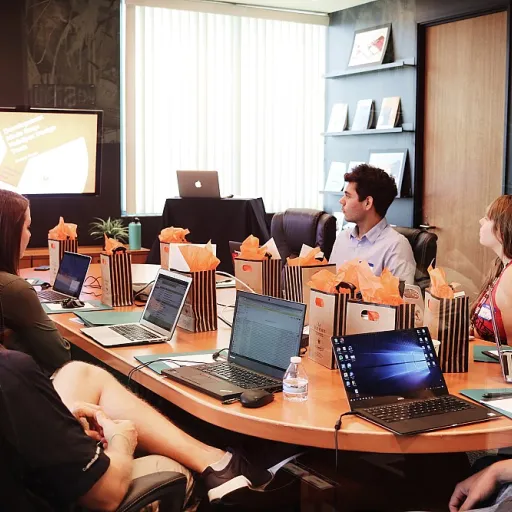
The Role of Executive Workshops in Strategic Planning
Transforming Strategic Plans Through Executive Workshops
In today's dynamic business landscape, the need for organizations to adapt and evolve cannot be overstated. One powerful tool companies are utilizing to maintain or gain a competitive edge is executive workshops. These workshops play an integral role in strategic planning by equipping leaders and their teams with the necessary skills and insights to foster growth and transformation. Executive workshops serve as a pivotal setting where key decision-makers can collaborate, communicate, and refine their strategic vision. They provide a platform for leaders to engage in leadership training, allowing them to hone essential management skills such as decision making, emotional intelligence, and change management. Such training programs ensure that leaders are well-equipped to steer their organizations effectively amidst the ever-changing market conditions. These sessions often employ a hands-on approach that encourages active participation and experiential learning. Leaders learn how to cultivate leadership skills that are crucial in driving business success, such as communication skills and emotional intelligence. Through management leadership discussions, participants can gain diverse perspectives, encouraging innovative strategies and solutions. The workshop environment promotes open communication among team members, which is critical for addressing specific organizational challenges. It ensures that all voices are heard and that the executive team is aligned on the organization's objectives. This alignment is vital for strategic cohesion and effective execution of strategies. Moreover, workshops provide an opportunity for leaders to step back from day-to-day operations and engage in high-level strategic discussions. This creates a conducive work environment for leadership development, where leaders can learn to think critically about their roles within the broader organizational context. As organizations navigate the path to strategic transformation, executive workshops can provide the framework and inspiration needed for effective strategy development. To explore more insights on how to cultivate transformative strategies, see this analysis on effective transformation strategy.Tailoring Workshops to Address Unique C-Suite Challenges
Addressing the Unique Challenges of the C-Suite
Executive workshops are not one-size-fits-all events. They must be tailored to address the unique challenges faced by the C-suite, ensuring that leaders walk away with actionable insights and skills. The key to achieving this lies in understanding the specific needs and dynamics of the executive team, which can vary significantly from one organization to another.
First, it's essential to identify the core challenges that the C-suite is grappling with. These could range from strategic decision-making and change management to enhancing communication skills and emotional intelligence. By pinpointing these areas, workshops can be designed to focus on the most relevant training topics, ensuring that the time spent is both productive and impactful.
Moreover, workshops should incorporate elements of leadership development and management training that resonate with the organization's strategic goals. This might include sessions on leadership skills, effective communication, and fostering a collaborative work environment. By aligning the workshop content with the broader organizational strategies, leaders can learn to navigate complex challenges more effectively.
Another crucial aspect is the format of the workshop. Whether it's a day workshop or a series of sessions, the structure should facilitate active participation and engagement. Interactive elements such as group discussions, case studies, and role-playing can enhance learning and encourage leaders to apply new skills in real-world scenarios.
Finally, it's important to foster an environment where leaders feel comfortable sharing their experiences and insights. This can lead to a deeper understanding of team dynamics and help build stronger cohesion among team members. By creating a space for open communication and collaboration, workshops can become a powerful tool for leadership development.
For more insights on crafting a visionary strategy that aligns with these principles, you can explore this resource.
Facilitating Innovation and Creative Problem Solving
Encouraging Fresh Perspectives and Innovative Solutions
Incorporating creative problem solving and fostering innovation within executive workshops is a crucial step in aligning strategic planning with cutting-edge solutions. The dynamic nature of today's business environment necessitates leaders who can effectively adapt and lead organizations through continuous change. Workshops serve as platforms for enhancing communication skills, encouraging leaders to think beyond traditional boundaries and explore novel strategies.
One productive approach adopted in these sessions is encouraging open dialogue and collaboration. By facilitating a safe space for transparent communication, executives are inspired to share diverse perspectives and leverage collective intelligence to fuel innovative ideas. This not only aids in effective decision making but also enriches leadership development through real-world problem solving.
Additionally, strategic training programs integrate critical components of emotional intelligence and change management. By addressing topics like emotional intelligence, leaders learn to navigate complex interpersonal dynamics, improving both personal performance and team cohesion. Management training that highlights adaptive leadership in varied work environments cultivates resilience in leaders facing unpredictable market challenges.
Overall, workshops that emphasize leadership skills encourage executives to refine their abilities in creative problem solving. They guide leaders to dismantle obstacles and foster groundbreaking ideas, ensuring the leadership workshop not only enhances individual skills but also benefits the organization as a whole. Implementing these strategies within workshops will drive the development of strong, forward-thinking leaders ready to tackle future strategies head-on.
Building Cohesion and Alignment Among Executive Teams
Fostering Unity and Shared Vision
In the dynamic landscape of corporate strategy, building cohesion and alignment among executive teams is paramount. Executive workshops serve as a crucial platform for fostering unity and a shared vision, which are essential for effective leadership and strategic execution. These workshops are not just about imparting knowledge; they are about creating an environment where leaders can engage in meaningful dialogue, share insights, and align their goals.
One of the key benefits of these workshops is the opportunity they provide for leaders to enhance their communication skills. Effective communication is the cornerstone of any successful organization, and workshops offer a structured setting where executives can practice and refine these skills. Through interactive sessions and role-playing exercises, leaders learn to articulate their ideas clearly and listen actively, which in turn strengthens team dynamics.
Enhancing Leadership Skills Through Collaborative Learning
Leadership workshops are designed to address the unique challenges faced by C-suite executives. By focusing on leadership development, these programs help leaders to hone their decision-making abilities and emotional intelligence. The collaborative nature of workshops encourages leaders to learn from one another, sharing experiences and strategies that can be applied to their own management practices.
Moreover, workshops provide a platform for leaders to engage in change management exercises, which are critical in today’s fast-paced business environment. By simulating real-world scenarios, executives can practice navigating complex challenges, thereby improving their ability to lead their teams through periods of transformation.
Creating a Supportive Work Environment
Workshops also play a vital role in creating a supportive work environment. By bringing together team members from different departments, these sessions promote cross-functional collaboration and understanding. This not only enhances the overall work environment but also ensures that all team members are aligned with the organization’s strategic objectives.
In conclusion, executive workshops are an invaluable tool for building cohesion and alignment among executive teams. By focusing on leadership training and development, these workshops equip leaders with the skills they need to effectively guide their organizations towards success. As organizations continue to evolve, the importance of these workshops in fostering a unified and strategic approach cannot be overstated.
Measuring the Impact of Executive Workshops on Strategy
Evaluating Workshop Outcomes to Enhance Strategic Direction
Executive workshops can be a transformative force in shaping strategic direction, provided their impacts are properly measured and analyzed. Leaders need to focus on specific metrics to examine the effectiveness of these initiatives in relation to overall strategy implementation and organizational goals.- Short-term and Long-term Impact: One of the first steps in assessing workshops' effectiveness is distinguishing between immediate outcomes and long-term benefits. While some skills and insights may be immediately applicable, others might not manifest fully until strategic priorities are executed over time.
- Feedback Mechanisms: Implementing a robust feedback system is crucial. Feedback from team members involved in these workshops helps in understanding the immediate response and facilitating necessary tweaks in future workshops. Encourage open communication to capture how the workshops address key challenges.
- Actionable Outcomes: Measure if the workshops lead to actionable outcomes. Did they effectively enhance decision making? Are leaders applying new management strategies? Successful workshops should encourage executives to apply leadership, communication, and emotional intelligence skills in their daily operations.
- Leadership Development Benchmarks: Establish benchmarks for leadership development and use these to gauge the program's success. Beyond leadership training, workshops can foster skills like change management and innovative problem-solving, which should be tracked over time.
- Alignment with Organizational Goals: Evaluate whether workshops align with broader organizational objectives. A comprehensive assessment will reveal if the insights and skills fostered during the workshops have effectively aligned team strategies with the organizational vision.
Best Practices for Organizing Effective Executive Workshops
Organizing Executive Workshops for Optimal Impact
Creating an effective executive workshop requires a blend of meticulous planning and adaptability. Here, we outline several best practices to ensure these workshops not only meet strategic objectives but also enhance leadership and team development.- Define Clear Objectives: Before crafting a workshop agenda, it's crucial to understand what the organization aims to achieve. Whether it's enhancing leadership skills or facilitating change management, clarity in goals sets the foundation for success.
- Select Relevant Training Topics: Tailor the content to address the unique challenges your executive teams face. Integrating topics like decision making, emotional intelligence, and advanced communication skills can enrich the learning experience.
- Engage Experienced Facilitators: Skilled facilitators bring a wealth of experience and can adapt content to suit dynamic discussions. Their expertise in leadership development and management training is instrumental in aligning your team's objectives.
- Encourage Active Participation: The workshop should be interactive, encouraging executives to engage with the material. Practical exercises, group discussions, and case studies can enhance learning and aid in applying new strategies effectively.
- Foster a Collaborative Environment: The atmosphere must promote open communication. When leaders work collaboratively, it strengthens team cohesion and aligns them towards common goals.
- Incorporate Feedback Mechanisms: Gather input from participants regarding the workshop’s effectiveness. This not only provides insights into areas of improvement but also demonstrates a commitment to continuous leadership management refinement.
- Follow-Up Actions: Implement a follow-up program to reinforce learned skills and strategies. Leadership workshops should have post-event activities to ensure long-term retention and application in the work environment.














